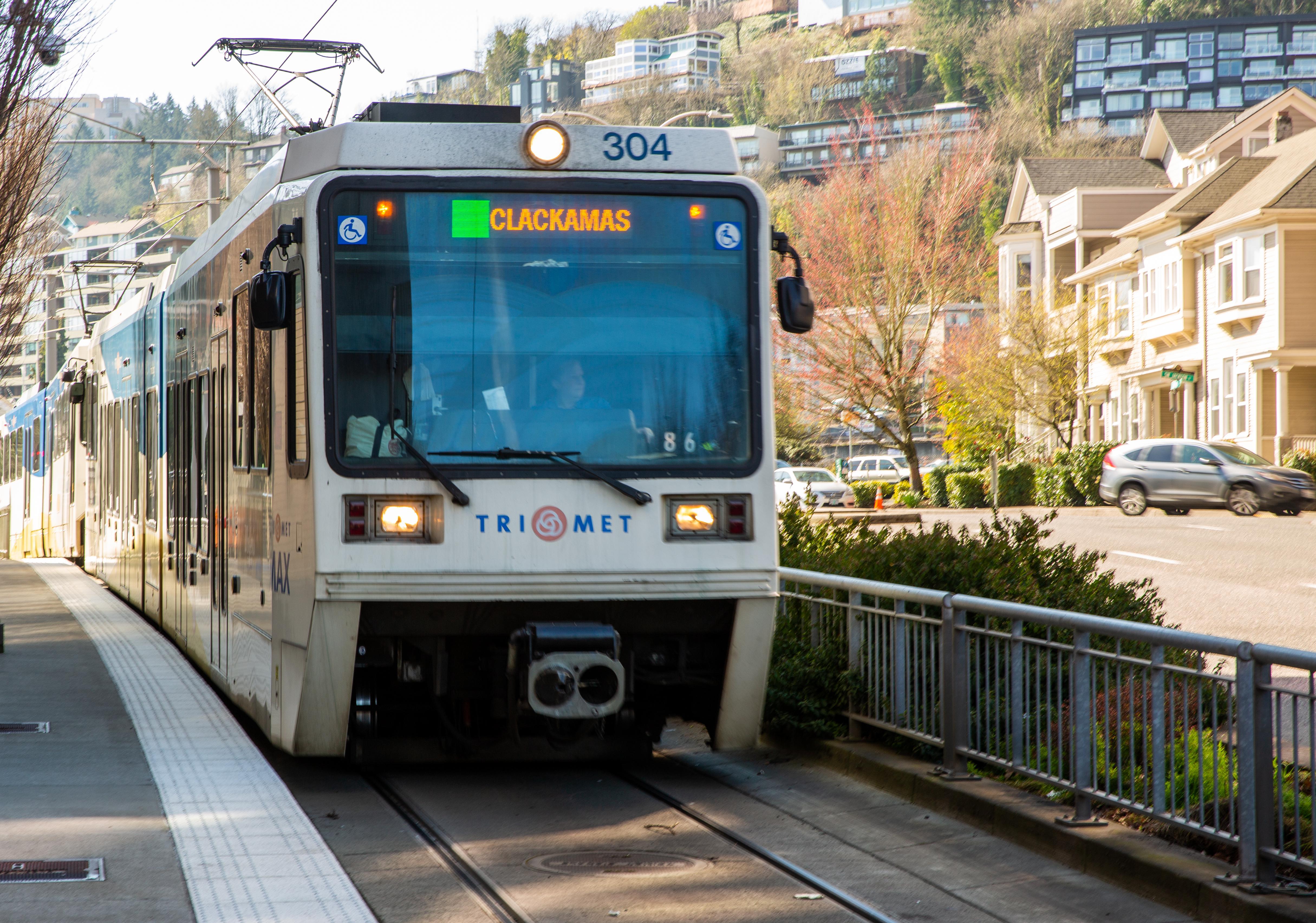The Oregon Metro Council Thursday voted unanimously to refer a roughly $5 billion transportation bond measure to the November ballot.

A TriMet Green Line MAX train approaches a station in southwest Portland, Ore., on Friday, March 20, 2020. The public transportation agency reported widespread dips in ridership due to the ongoing coronavirus pandemic.
Bryan M. Vance / OPB
The "Get Moving 2020" plan includes safety improvements and public transportation expansions throughout 17 "investment corridors" across the Portland region.
Metro, the regionally elected government for Multnomah, Washington and Clackamas counties, said if voters pass the measure to pay for transportation projects across the region, funding would come in the form of a payroll tax beginning in 2022. Businesses with 25 or fewer employees would be exempt from paying the tax.
Notably, during its Thursday meeting, the Metro Council added an amendment to the measure, also exempting state and local governments from paying the tax, citing the coronavirus pandemic’s economic effects on government specifically as well as legal ambiguities regarding Metro’s authority to tax those governments.
“In the almost 30 years that I have lived here, people in this region have been talking about the need to invest in this transportation system,” Metro Council President Lynn Peterson said Thursday. “With this measure, we took that mold which we have been using for the last 70 to 80 years and we just broke it, and in its place we relied on public engagement and a transparent process to create a measure based on the shared values and shared needs of this entire region.”
The plan includes projects expected to span the next 20 years. It would include nearly $4 billion toward projects in areas such as Tualatin Valley Highway, McLoughlin Boulevard and the Southwest Corridor Light Rail — a proposed expansion of the MAX train system into Southwest Portland, Tigard and Tualatin. An additional $1 billion is expected to go to regional programs including creating safer routes to schools, free youth transit passes and replacing diesel buses with electric or low-carbon buses. In addition to local funding, Metro also expects to leverage more than $2 billion in federal or state funding — making the transportation plan worth roughly $7 billion in total.
“We’re living in a liminal moment. One of social movements and airing of structural inequities that have long been woven into the structure of our society,” Metro Councilor Christine Lewis said during Thursday’s meeting. “It’s our duty to be brave and bold with our vision of recovery, of reimagining what the world will look like, and this measure, through its process, the product, the projects and the policies, it’s all part of that reimagined future.”
The measure has seen some opposition, significantly from the Portland Business Alliance — the Portland area’s largest chamber of commerce — and other business groups in the area. The coalition of groups had asked the Metro Council earlier this month to delay the referral of the measure to a later year, citing the economic downturn caused by the pandemic.
Representatives from many of those groups had been involved in the initial planning of the transportation package, the coalition wrote in a letter to councilors July 8, but “this package was completed before the COVID-19 pandemic hit Oregon. Since then, everything has changed,” the business groups wrote.
The groups cited additional taxes set to begin in 2021, such as new personal and business income taxes related to a homeless services measure voters passed in May.
“Local employers are also absorbing the new state Commercial Activities Tax, increase in the Portland Business License Fee and Multnomah County Business Income Tax, and the new Portland Clean Energy Fund gross receipts tax,” the business groups wrote.
Jon Isaacs, vice president of government affairs for the Portland Business Alliance, spoke Thursday during the council meeting’s public testimony.
“Oregon is now in a severe economic downturn with more than 300,000 Oregonians having filed for unemployment,” Isaacs said. “Now, with the impending personal and business income taxes and the severe downturn, a new payroll tax does not make any sense.”
Isaacs also asked why Metro made the amendment to exempt state and local governments from the payroll tax.
“That would collectively be the largest employer group in the region who use our transportation system,” Isaacs said of the exempted governments.
Metro Councilor Lewis brought forth that amendment.
“We are at a point where I think it is essential that we ensure local government partners can continue to provide the critical services to their communities that we all depend on,” Lewis said. “In many cases, our cities and counties have faced tight budget cycles, even in recent boom years, and we cannot undercut them now when we know it’s likely that their economic rebound will be behind the rest of the economy.”
Metro Councilor Bob Stacey pointed out that there are ambiguities around whether Metro has the authority to tax state or local governments. So, in making that amendment, the council is avoiding a potential legal fight in the future.
The proposed tax cannot exceed 0.75% of a business’ payroll, according to the ordinance. Metro has not decided whether the tax would begin with a rate of 0.75% in 2022 or initially start at a lower rate and gradually increase to 0.75% in future years.
Metro will decide the specifics of that tax structure in future meetings.
Council President Peterson said that the transportation plan will bring significant economic growth to the region in the form of an estimated 37,500 jobs related to the construction projects.
“As our region faces record unemployment, we need these jobs more than ever, and as we recover from this pandemic and return people to school and jobs, we will need a transportation system that gets people where they need to go safely and reliably,” she said. “We can rebuild our transportation system and our economy at the same time.”
